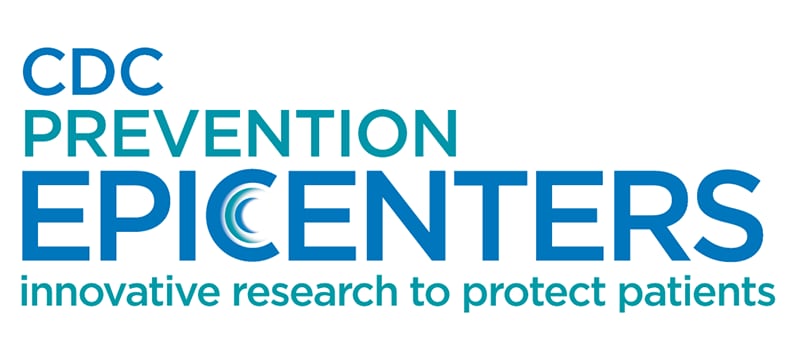The Johns Hopkins University Prevention Epicenter
First Funded: 1997
Overview: The Johns Hopkins University Prevention Epicenter’s studies address knowledge gaps and develop strategies to improve the safety of patients and healthcare workers by preventing transmission of pathogens and improving antibiotic use in diverse healthcare settings and patient populations.

About this Epicenter
The Johns Hopkins Prevention Epicenter research translates basic, epidemiologic, and technologic discoveries into new strategies to prevent healthcare-associated infections (HAIs) and antimicrobial resistance (AR) and to improve how antibiotics and diagnostic tests are used across all healthcare settings. These studies demonstrate the Epicenter’s capacity to integrate expertise in healthcare epidemiology and antibiotic stewardship with other disciplines, including human factors engineering, data science, machine learning, microbiology, mathematical modeling, microbiome science, and implementation science.
The Johns Hopkins Prevention Epicenter includes a multi-disciplinary collaborative team of researchers and faculty from the Johns Hopkins University School of Medicine, the Johns Hopkins Bloomberg School of Public Health, and The Johns Hopkins Hospital Departments of Hospital Epidemiology and Infection Control and Antimicrobial Stewardship.
The research team has expertise in infection prevention surveillance, implementation science, antimicrobial stewardship in acute, ambulatory and long-term care settings, healthcare epidemiology in acute, ambulatory and long-term care settings, human factors engineering, emergency preparedness, biopreparedness, data science, behavioral economics, pediatrics, microbiology, environmental microbiology, mathematical modeling, machine learning, microbiome statistics, and biostatistics.
Core Research Study Areas
The goal of these studies is to identify novel approaches to prevent HAIs and AR to help inform CDC guidance across multiple settings to reduce harm to patients and healthcare workers. This work includes six Core Projects and three Optional Collaborative Projects.
Core research study areas include:
- Transdisciplinary Research & Approaches to Improve Environmental Cleaning in Long-Term Care Facilities (TRAIN in LTC)
- Investigative Leads: Morgan J. Katz, MD, MHS and Clare Rock, MD, MS
- An Electronic Approach to Detecting and Quantifying Harm Associated with Antibiotics (ABX-Harm)
- Investigative Leads: Sara E. Cosgrove, MD, MS and Eili Y. Klein, MA, PhD
- Better Evaluation and Assessment of Transmission via the Healthcare Environment to Better Measure Cleaning (BEAT the BUG)
- Investigative Leads: Clare Rock, MD, MS, Scott R. Levin, MS, PhD, and Eili Y. Klein, MA, PhD
- Predicting Colonization with and Transmission of Extended-Spectrum β-lactamase (ESBL)-Producing Organisms (Predict ESBL)
- Investigative Leads: Pranita D. Tamma, MD, MHS, Patricia Simner, MSc, PhD, and Sara E. Cosgrove, MD, MS
- Characterizing the Nasal Microbiota in Neonates that Do and Do not Develop Staphylococcus aureus Bloodstream Infections (SA Nosomics)
- Investigative Leads: Aaron M. Milstone, MD, MHS and Sara E. Cosgrove, MD, MS
- Healthcare-Worker Interactive Pathogen Exposure Response System (H-WIPERS)
- Investigative Leads: Eili Y. Klein, MA, PhD, Lisa L. Maragakis, MD, MPH, and Clare Rock, MD, MS
Multicenter Collaborative Research Projects
- A Diagnostic Stewardship Intervention to Improve Blood Culture Use Among Adult Patients in Acute Care Hospitals
- Investigative Leads: Valeria Fabre, MD and Sara E. Cosgrove, MD, MS
- Central Line-Associated Bloodstream Infection (CLABSI) Present-on-Admission (POA): Mapping the Regional Burden
- Investigative Leads: Sara C. Keller, MD, MPH, MSHP, Sara E. Cosgrove, MD, MS and Clare Rock, MD, MS
- Improving Birth Weight Risk Adjustment for Hospital-Onset Bacteremia Reporting in the Neonatal Intensive Care Unit
- Investigative Leads: Aaron M. Milstone, MD, MHS and Clare Rock, MD, MS